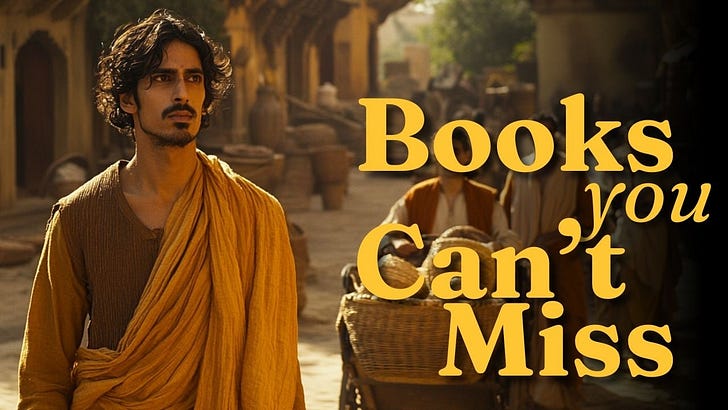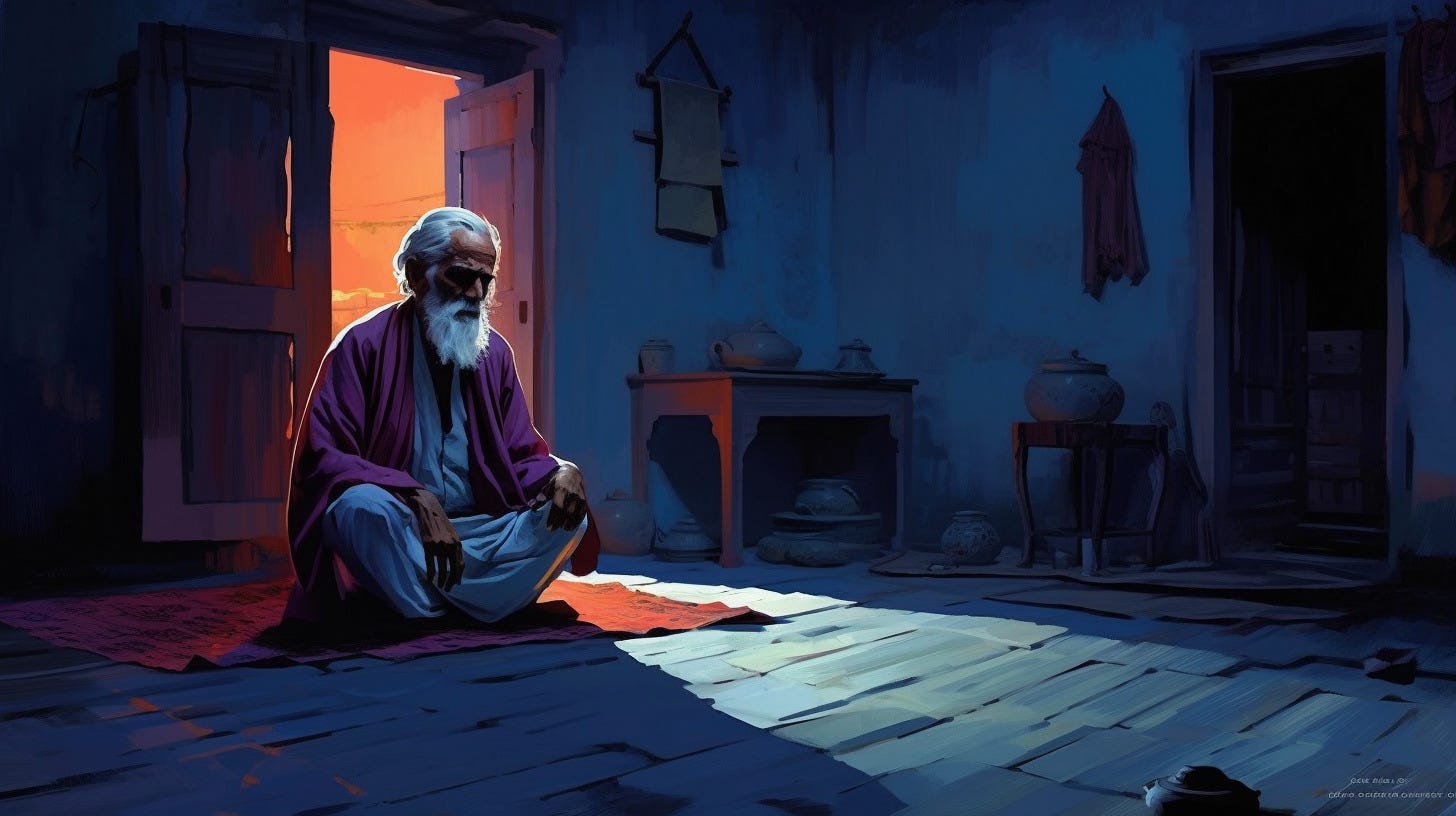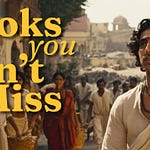Today, we’re coming to the third part of our reading of Hermann Hesse’s Siddhartha, the life story of a young Hindu man at the time of the Buddha.
In the beginning of the book, discussed in the first post in this series, young Siddhartha leaves his home village together with his friend Govinda, and they join a group of ascetics who live in the wilderness. They stay with them for three years, but slowly Siddhartha realises that the whole wisdom of life cannot consist in only running away from it and hiding among wild animals. So he and Govinda travel on, following rumours of the appearance of the Buddha, a wise man who has found the secret to end all suffering. They meet the Buddha, and Govinda becomes a Buddhist monk, but Siddhartha has his doubts: of all the monks in the Buddha’s garden, only one seems to him to be truly enlightened: the Buddha himself. And he is also the only one achieved his enlightenment without following the Buddhist teachings. Siddhartha questions whether enlightenment can be taught at all. Perhaps one needs to arrive at it through the process of experiencing life itself. He parts from the Buddha and from Govinda and makes his way towards the next town.
There he meets Kamala, a thoughtful courtesan who likes him and helps him get a job as a merchant’s assistant. In time, Siddhartha’s three special abilities (“I can think. I can wait. I can fast”) prove to be a key for success, not only in the wilderness but also in the world of commerce. Siddhartha makes a fortune without ever really wanting to, and feels increasingly trapped in his life of luxury, while he feels that his dream of the enlightenment keeps receding into the distance. One day, he cannot bear his existence as a man of the world any more. In the night he flees from his life. Without saying farewell, he walks out of his garden, leaving it all behind forever.
In the same hour of the night, Siddhartha left his garden, left the city, and never came back. ...
When she [Kamala] received the first news of Siddhartha’s disappearance, she went to the window, where she held a rare singing bird captive in a golden cage. She opened the door of the cage, took the bird out and let it fly. For a long time, she gazed after it, the flying bird. From this day on, she received no more visitors and kept her house locked. But after some time, she became aware that she was pregnant from the last time she was together with Siddhartha.
By the River
Siddhartha walked through the forest, was already far from the city, and knew nothing but that one thing, that there was no going back for him, that this life, as he had lived it for many years until now, was over and done away with, and that he had tasted all of it, sucked everything out of it until he was disgusted with it. Dead was the singing bird he had dreamt of. Dead was the bird in his heart. Deeply, he had been entangled in Sansara, he had sucked up disgust and death from all sides into his body, like a sponge sucks up water until it is full. And full he was, full of the feeling of been sick of it, full of misery, full of death, there was nothing left in this world which could have attracted him, given him joy, given him comfort.
So Siddhartha stumbles into the forest, not knowing where he’s going or why. He crosses the forest and arrives at a river, and there he suddenly stops. He recognises the river he crossed as a young man, when he first came to this city. Then he knew where he was going — but where is he going now?
... Whatever for should he walk on, wherever to, to which goal? No, there were no more goals, there was nothing left but the deep, painful yearning to shake off this whole desolate dream, to spit out this stale wine, to put an end to this miserable and shameful life.
A hang bent over the bank of the river, a coconut-tree; Siddhartha leaned against its trunk with his shoulder, embraced the trunk with one arm, and looked down into the green water, which ran and ran under him, looked down and found himself to be entirely filled with the wish to let go and to drown in these waters. A frightening emptiness was reflected back at him by the water, answering to the terrible emptiness in his soul. Yes, he had reached the end. There was nothing left for him, except to annihilate himself, except to smash the failure into which he had shaped his life, to throw it away, before the feet of mockingly laughing gods. This was the great vomiting he had longed for: death, the smashing to bits of the form he hated! Let him be food for fishes, this dog Siddhartha, this lunatic, this depraved and rotten body, this weakened and abused soul! Let him be food for fishes and crocodiles, let him be chopped to bits by the daemons!
With a distorted face, he stared into the water, saw the reflection of his face and spit at it. In deep tiredness, he took his arm away from the trunk of the tree and turned a bit, in order to let himself fall straight down, in order to finally drown. With his eyes closed, he slipped towards death.
But at this last moment, the memory of a long-forgotten word comes back to him, a syllable “which is the beginning and the end of all prayers of the Brahmans, the holy ‘Om’...” Siddhartha suddenly realises what he was about to do.
Om! he spoke to himself: Om! and again he knew about Brahman, knew about the indestructibility of life, knew about all that is divine, which he had forgotten.
But this was only a moment, flash. By the foot of the coconut-tree, Siddhartha collapsed, struck down by tiredness, mumbling Om, placed his head on the root of the tree and fell into a deep sleep.
When he awakes, hours later, a Buddhist monk is sitting by his side, guarding his sleep. The monk explains that there are wild animals in this forest, and since he was passing through, he thought it his duty to stop and stay with the sleeping man who a while. The monk does not recognise the man in the rich clothes, but Siddhartha looks into the face of his childhood friend and immediately knows that it was Govinda who, once more, stayed by his side when Siddhartha needed him. Siddhartha tells him who he is.
“And now, Siddhartha, what are you now?”
“I don’t know it, I don’t know it just like you. I’m travelling. I was a rich man and am no rich man any more, and what I’ll be tomorrow, I don’t know.”
“You’ve lost your riches?”
“I’ve lost them or they me. They somehow happened to slip away from me. The wheel of physical manifestations is turning quickly, Govinda. Where is Siddhartha the Brahman? Where is Siddhartha the Samana? Where is Siddhartha the rich man? Non-eternal things change quickly, Govinda, you know it.”
Govinda looked at the friend of his youth for a long time, with doubt in his eyes. After that, he gave him the salutation which one would use on a gentleman and went on his way.
The Ferryman
Siddhartha is refreshed from his sleep and the meeting with his friend. It seems to him that the river has taken away the old Siddhartha and left him empty again, ready to find a new life. And Siddhartha knows that this life will begin right here:
By this river I want to stay, thought Siddhartha, it is the same which I have crossed a long time ago on my way to the childlike people, a friendly ferryman had guided me then, he is the one I want to go to, starting out from his hut, my path had led me at that time into a new life, which had now grown old and is dead — my present path, my present new life, shall also take its start there!
Siddhartha meets the old ferryman, the same one who had brought him over the river the first time, when Siddhartha had just come from the hermits and the meeting with the Buddha. The ferryman remembers him, and offers Siddhartha a place to stay for a while. Siddhartha learns to work the ferry, he helps the old ferryman, Vasudeva, with his small rice plot, they cook and eat and live together. And one day, they talk about the river.
“Did you,” so [Siddhartha] asked [Vasudeva] at one time, “did you too learn that secret from the river: that there is no time?”
Vasudeva’s face was filled with a bright smile.
“Yes, Siddhartha,” he spoke. “It is this what you mean, isn’t it: that the river is everywhere at once, at the source and at the mouth, at the waterfall, at the ferry, at the rapids, in the sea, in the mountains, everywhere at once, and that there is only the present time for it, not the shadow of the past, not the shadow of the future?”
“This it is,” said Siddhartha. “And when I had learned it, I looked at my life, and it was also a river, and the boy Siddhartha was only separated from the man Siddhartha and from the old man Siddhartha by a shadow, not by something real. Also, Siddhartha’s previous births were no past, and his death and his return to Brahma was no future. Nothing was, nothing will be; everything is, everything has existence and is present.”
Siddhartha spoke with ecstasy; deeply, this enlightenment had delighted him. Oh, was not all suffering time, were not all forms of tormenting oneself and being afraid time, was not everything hard, everything hostile in the world gone and overcome as soon as one had overcome time, as soon as time would have been put out of existence by one’s thoughts? In ecstatic delight, he had spoken, but Vasudeva smiled at him brightly and nodded in confirmation; silently he nodded, brushed his hand over Siddhartha’s shoulder, turned back to his work.
And once again, when the river had just increased its flow in the rainy season and made a powerful noise, then said Siddhartha: “Isn’t it so, oh friend, the river has many voices, very many voices? Hasn’t it the voice of a king, and of a warrior, and of a bull, and of a bird of the night, and of a woman giving birth, and of a sighing man, and a thousand other voices more?”
“So it is,” Vasudeva nodded, “all voices of the creatures are in its voice.”
“And do you know,” Siddhartha continued, “what word it speaks, when you succeed in hearing all of its ten thousand voices at once?”
Happily, Vasudeva’s face was smiling, he bent over to Siddhartha and spoke the holy Om into his ear. And this had been the very thing which Siddhartha had also been hearing.
One day, news from the Buddha’s impending death come to the town and many people, monks as well as laymen, travel to have one last look at the holy man. They all cross the river at the ferry, and it is here that Siddhartha meets Kamala again, who is now travelling with her boy, Siddhartha’s son. But Kamala has been bitten by a snake on the way, and in the night she dies.
Siddhartha now is alone with his son, a new role again, for which he is not prepared. The boy grows up unhappy with the two old men by the river, but Siddhartha does not know what to do about it. He is afraid to bring the boy back to the city, afraid of what might become of him and of the young man among the temptations that he, Siddhartha, had finally managed to escape. But he also recognises that he cannot keep him forever by the ferry.
Their unhappy relationship ends when the boy runs away. Siddhartha tries to follow him for a while, but the boy is far ahead and Siddhartha knows that he won’t be able to find him. He finally gives up the chase, lets the boy go, and returns to the ferryman’s hut, to Vasudeva, and to the river.
A long time later, the two men sit quietly by the river. Vasudeva is old now, he does not row the ferry any more. But they still sit together by the river and listen to it.
They listened. Softly sounded the river, singing in many voices. Siddhartha looked into the water, and images appeared to him in the moving water: his father appeared, lonely, mourning for his son; he himself appeared, lonely, he also being tied with the bondage of yearning to his distant son; his son appeared, lonely as well, the boy, greedily rushing along the burning course of his young wishes, each one heading for his goal, each one obsessed by the goal, each one suffering. The river sang with a voice of suffering, longingly it sang, longingly, it flowed towards its goal, lamentingly its voice sang.
“Do you hear?” Vasudeva’s mute gaze asked. Siddhartha nodded.
“Listen better!” Vasudeva whispered.
Siddhartha made an effort to listen better. The image of his father, his own image, the image of his son merged, Kamala’s image also appeared and was dispersed, and the image of Govinda, and other images, and they merged with each other, turned all into the river, headed all, being the river, for the goal, longing, desiring, suffering, and the river’s voice sounded full of yearning, full of burning woe, full of unsatisfiable desire. For the goal, the river was heading, Siddhartha saw it hurrying, the river, which consisted of him and his loved ones and of all people he had ever seen, all of these waves and waters were hurrying, suffering, towards goals, many goals, the waterfall, the lake, the rapids, the sea, and all goals were reached, and every goal was followed by a new one, and the water turned into vapour and rose to the sky, turned into rain and poured down from the sky, turned into a source, a stream, a river, headed forward once again, flowed on once again. But the longing voice had changed. It still resounded, full of suffering, searching, but other voices joined it, voices of joy and of suffering, good and bad voices, laughing and sad ones, a hundred voices, a thousand voices.
... Already, he could no longer tell the many voices apart, not the happy ones from the weeping ones, not the ones of children from those of men, they all belonged together, the lamentation of yearning and the laughter of the knowledgeable one, the scream of rage and the moaning of the dying ones, everything was one, everything was intertwined and connected, entangled a thousand times. And everything together, all voices, all goals, all yearning, all suffering, all pleasure, all that was good and evil, all of this together was the world. All of it together was the flow of events, was the music of life. And when Siddhartha was listening attentively to this river, this song of a thousand voices, when he neither listened to the suffering nor the laughter, when he did not tie his soul to any particular voice and submerged his self into it, but when he heard them all, perceived the whole, the oneness, then the great song of the thousand voices consisted of a single word, which was Om: the perfection.
Govinda
Vasudeva dies, and Siddhartha is now the ferryman by the river. And one day, monks in yellow robes pass through the forest, and Siddhartha once again recognises his friend Govinda, now also an old man. Govinda stays for the night in the ferryman’s hut, and the two friends talk. Govinda has not found the peace he was looking for, but he can see that Siddhartha has.
“Siddhartha,” he spoke, “we have become old men. It is unlikely for one of us to see the other again in this incarnation. I see, beloved, that you have found peace. I confess that I haven’t found it. Tell me, oh honourable one, one more word, give me something on my way which I can grasp, which I can understand! Give me something to be with me on my path. It is often hard, my path, often dark, Siddhartha.”
Siddhartha said nothing and looked at him with the ever unchanged, quiet smile. Govinda stared at his face, with fear, with yearning, suffering, and the eternal search was visible in his look, eternal not-finding. ...
“Bend down to me!” he whispered quietly in Govinda’s ear. “Bend down to me! Like this, even closer! Very close! Kiss my forehead, Govinda!”
But while Govinda with astonishment, and yet drawn by great love and expectation, obeyed his words, bent down closely to him and touched his forehead with his lips, something miraculous happened to him. ...
He no longer saw the face of his friend Siddhartha, instead he saw other faces, many, a long sequence, a flowing river of faces, of hundreds, of thousands, which all came and disappeared, and yet all seemed to be there simultaneously, which all constantly changed and renewed themselves, and which were still all Siddhartha. He saw the face of a fish, a carp, with an infinitely painfully opened mouth, the face of a dying fish, with fading eyes — he saw the face of a new-born child, red and full of wrinkles, distorted from crying — he saw the face of a murderer, he saw him plunging a knife into the body of another person — he saw, in the same second, this criminal in bondage, kneeling and his head being chopped off by the executioner with one blow of his sword — he saw the bodies of men and women, naked in positions and cramps of frenzied love — he saw corpses stretched out, motionless, cold, void — he saw the heads of animals, of boars, of crocodiles, of elephants, of bulls, of birds — he saw gods, saw Krishna, saw Agni—he saw all of these figures and faces in a thousand relationships with one another, each one helping the other, loving it, hating it, destroying it, giving re-birth to it, each one was a will to die, a passionately painful confession of transitoriness, and yet none of them died, each one only transformed, was always reborn, received evermore a new face, without any time having passed between the one and the other face—and all of these figures and faces rested, flowed, generated themselves, floated along and merged with each other, and they were all constantly covered by something thin, without individuality of its own, but yet existing, like a thin glass or ice, like a transparent skin, a shell or mold or mask of water, and this mask was smiling, and this mask was Siddhartha’s smiling face, which he, Govinda, in this very same moment touched with his lips. And, Govinda saw it like this, this smile of the mask, this smile of oneness above the flowing forms, this smile of simultaneousness above the thousand births and deaths, this smile of Siddhartha was precisely the same, was precisely of the same kind as the quiet, delicate, impenetrable, perhaps benevolent, perhaps mocking, wise, thousand-fold smile of Gotama, the Buddha, as he had seen it himself with great respect a hundred times. Like this, Govinda knew, the perfected ones are smiling.
Not knowing any more whether time existed, whether the vision had lasted a second or a hundred years, not knowing any more whether there existed a Siddhartha, a Gotama, a me and a you, feeling in his innermost self as if he had been wounded by a divine arrow, the injury of which tasted sweet, being enchanted and dissolved in his innermost self, Govinda still stood for a little while bent over Siddhartha’s quiet face, which he had just kissed, which had just been the scene of all manifestations, all transformations, all existence. The face was unchanged, after under its surface the depth of the thousand-foldness had closed up again, he smiled silently, smiled quietly and softly, perhaps very benevolently, perhaps very mockingly, precisely as he used to smile, the exalted one.
Deeply, Govinda bowed; tears he knew nothing of, ran down his old face; like a fire burned the feeling of the most intimate love, the humblest veneration in his heart. Deeply, he bowed, touching the ground, before him who was sitting motionlessly, whose smile reminded him of everything he had ever loved in his life, what had ever been valuable and holy to him in his life.
Thus ends the tale of Siddhartha, the high-caste priest’s son who became a hermit, then a lover, a businessman, a rich man, a sick man, a ferryman, and who finally found his enlightenment in listening to a river. He found it not by following any teachings, and he found it only after he had stopped looking for it.
If you’d like to watch this as a video, here is the YouTube version of this post!
If you’d like to read Siddhartha yourself, you can find it here in an older English translation (the one quoted in this article):
https://www.gutenberg.org/files/2500/2500-h/2500-h.htm
And here in the original German:
https://www.gutenberg.org/cache/epub/2499/pg2499.html
See you next week!
— Andy












Share this post